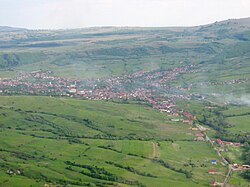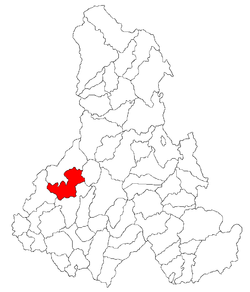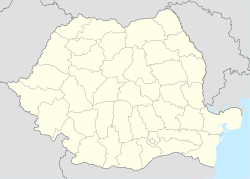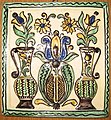Corund
Corund
Korond | |
|---|---|
Commune | |
 | |
 | |
| Coordinates: 46°28′0″N 25°11′0″E / 46.46667°N 25.18333°E | |
| Country | |
| County | Harghita County |
| Status | Commune |
| Government | |
| • Mayor | Mihály Katona (Democratic Union of Hungarians in Romania) |
| Area | |
| • Total | 113.51 km2 (43.83 sq mi) |
| Population (2011) | |
| • Total | 6,005 |
| • Density | 54.44/km2 (141.0/sq mi) |
| Ethnicity | |
| • Hungarians | 96.74% |
| • Gypsies | 2.93% |
| Time zone | UTC+2 (EET) |
| • Summer (DST) | UTC+3 (EEST) |
| Postal Code | 537060 |
| Area code | +40 266 |
| Website | www.korond.ro |
Corund (Template:Lang-hu, Hungarian pronunciation: [ˈkorond] ) is a commune in Harghita County, Romania. It lies in the Székely Land, an ethno-cultural region in eastern Transylvania, in the "Salt Region" (Ținutul Sării or Sóvidék). Corund is famous for its pottery and ceramics.
Component villages
The commune is composed of five villages, the administrative center being Corund:
| In Romanian | In Hungarian |
|---|---|
| Atia | Atyha |
| Calonda | Kalonda |
| Corund | Korond |
| Fântâna Brazilor | Fenyőkút |
| Valea lui Pavel | Pálpataka |
Governance

The village historically formed part of the Székely Land region of Transylvania province. It belonged to Udvarhelyszék, then, from 1876 until 1918, to Udvarhely County in the Kingdom of Hungary. After World War I, by the terms of the Treaty of Trianon of 1920, it became part of Romania. As a result of the Second Vienna Award, it was ceded to Hungary between 1940 and 1944. After World War II, it came under Romanian administration and became part of Romania in 1947. Between 1952 and 1960, it formed part of the Hungarian Autonomous Province, then, of the Mureș-Hungarian Autonomous Province until it was abolished in 1968. Since then, the commune has been part of Harghita County.
Demographics
The commune has an absolute Székely (Hungarian) majority. According to the 2011 census it has a population of 6,005 of which 96.74% or 5,809 are ethnic Hungarians.
Gallery
-
Korond pottery
-
Korond plate
-
Stove tile
References
- ^ Romanian Census 2002; retrieved on 6 May 2010






